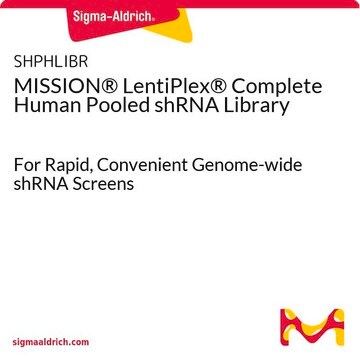ORFBFPH
MISSION® TRC3 ORF BFP Lentivirus High Titer Control
Se connecterpour consulter vos tarifs contractuels et ceux de votre entreprise/organisme
About This Item
Code UNSPSC :
41106609
Nomenclature NACRES :
NA.51
Produits recommandés
Conditionnement
vial of 200 μL
Niveau de qualité
Concentration
5x108 VP/ml (via p24 assay)
Application(s)
genome mapping
genomic analysis
Conditions d'expédition
dry ice
Température de stockage
−70°C
Catégories apparentées
Description générale
The MISSION TRC3 ORF BFP Lentivirus High Titer Control Transduction Particles contain an ORF insert expressing BFP, and is useful as a positive (or negative control) in experiments using the MISSION TRC3 LentiORF Library Collection in arrayed or pooled format, including our latest Whole Genome LentiORF Pool.
The BFP ORF control transduction particles are produced from the sequence-verified lentiviral plasmid, pLX307-puro-BFP (ORFBFP). This positive control can be used for measuring transduction efficiency and optimizing ORF delivery in cell lines that do not survive any puromycin exposure. The BFP Control contains a gene encoding BFP driven by the EF1a promoter. This control provides fast visual confirmation of successful transduction. Ampicillin and puromycin antibiotic resistance genes provide selection in bacterial or mammalian cells respectively.
Unlike murine-based MMLV or MSCV retroviral systems, lentiviral-based particles permit efficient infection and integration of the construct into differentiated and non-dividing cells, such as neurons and dendritic cells, overcoming low transfection and integration difficulties when using these cell lines. Self-inactivating replication incompetent viral particles are produced in packaging cells (HEK293T) by co-transfection with compatible packaging plasmids.
In addition, the Control Transduction Particles are pseudotyped with an envelope G glycoprotein from Vesicular Stomatitis Virus (VSV-G), allowing transduction of a wide variety of mammalian cells. 200 μl of 5x108 TU/ml (via p24 titering assay) lentiviral particles are provided as frozen stock.
This high titer offering is recommended for customers: who need to utilize smaller volumes of virus, who have very difficult to transduce cell lines, or who need to transduce large numbers of cells.
When conducting experiments using MISSION TRC3 ORF clones, the proper controls should be a key element of your experimental design to allow for accurate interpretation of gene and protein expression results. The MISSION Control Transduction Particles are a critical positive control to monitor transduction efficiency.
To see application data, protocols, vector maps, and more visit the TRC3 Information Page
The BFP ORF control transduction particles are produced from the sequence-verified lentiviral plasmid, pLX307-puro-BFP (ORFBFP). This positive control can be used for measuring transduction efficiency and optimizing ORF delivery in cell lines that do not survive any puromycin exposure. The BFP Control contains a gene encoding BFP driven by the EF1a promoter. This control provides fast visual confirmation of successful transduction. Ampicillin and puromycin antibiotic resistance genes provide selection in bacterial or mammalian cells respectively.
Unlike murine-based MMLV or MSCV retroviral systems, lentiviral-based particles permit efficient infection and integration of the construct into differentiated and non-dividing cells, such as neurons and dendritic cells, overcoming low transfection and integration difficulties when using these cell lines. Self-inactivating replication incompetent viral particles are produced in packaging cells (HEK293T) by co-transfection with compatible packaging plasmids.
In addition, the Control Transduction Particles are pseudotyped with an envelope G glycoprotein from Vesicular Stomatitis Virus (VSV-G), allowing transduction of a wide variety of mammalian cells. 200 μl of 5x108 TU/ml (via p24 titering assay) lentiviral particles are provided as frozen stock.
This high titer offering is recommended for customers: who need to utilize smaller volumes of virus, who have very difficult to transduce cell lines, or who need to transduce large numbers of cells.
When conducting experiments using MISSION TRC3 ORF clones, the proper controls should be a key element of your experimental design to allow for accurate interpretation of gene and protein expression results. The MISSION Control Transduction Particles are a critical positive control to monitor transduction efficiency.
To see application data, protocols, vector maps, and more visit the TRC3 Information Page
Application
Functional Genomics/Overexpression Screening/Target Validation
Notes préparatoires
Puro Kill Curve and Determining CFU (Colony Formation Unit) per mL. Prior to performing a library-scale screening, two preliminary experiments must be conducted. Visit the Lentiviralpool Information Page or refer to the technical bulletin.
Informations légales
Use of this product is subject to one or more license agreements. For details, please see the MISSION License Page
MISSION is a registered trademark of Merck KGaA, Darmstadt, Germany
Produit(s) apparenté(s)
Réf. du produit
Description
Tarif
Code de la classe de stockage
12 - Non Combustible Liquids
Classe de danger pour l'eau (WGK)
WGK 3
Point d'éclair (°F)
Not applicable
Point d'éclair (°C)
Not applicable
Certificats d'analyse (COA)
Recherchez un Certificats d'analyse (COA) en saisissant le numéro de lot du produit. Les numéros de lot figurent sur l'étiquette du produit après les mots "Lot" ou "Batch".
Déjà en possession de ce produit ?
Retrouvez la documentation relative aux produits que vous avez récemment achetés dans la Bibliothèque de documents.
Notre équipe de scientifiques dispose d'une expérience dans tous les secteurs de la recherche, notamment en sciences de la vie, science des matériaux, synthèse chimique, chromatographie, analyse et dans de nombreux autres domaines..
Contacter notre Service technique






